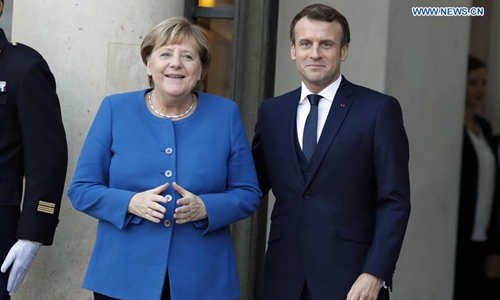By Global Times (8 June 2020) – Although the EU-China summit, originally set to take place in September in Leipzig, Germany, had to be rescheduled due to the COVID-19 pandemic, German Foreign Minister Heiko Maas said on Sunday that he hoped the summit could take place later this year, when Berlin takes over the rotating presidency of the Council of the European Union.
Since the outbreak of COVID-19, the US has escalated its war of words against China and taken tough stances toward the world’s second-largest economy. These US moves have, to some extent, affected some European countries’ attitude toward China. This has piled up difficulties for the EU’s internal coordination. Nonetheless, Europe’s two biggest countries – Germany and France – have shown the bloc’s willingness to keep stable and sound ties with China.
President Xi Jinping spoke with German Chancellor Angela Merkel and French President Emmanuel Macron on the phone respectively on Wednesday and Friday. In the phone conversations, Merkel said that Germany will stay in close touch with China to advance important bilateral and EU-China agendas and take forward the relationships. Macron noted that France attaches great importance to the upcoming major exchanges between the EU and China and is ready to play an active role in this regard.
Amid the ongoing pandemic, some European countries have changed their views of China – also due to US influence. This has increased the difficulty of work Germany and France will have to do to coordinate the 27 EU member states. The bloc needs to reach a consensus in terms of policies and strategies toward China. This is important for the EU, but it is not an easy task in the short term, especially with the discords sowed by the US.
Dieter Kempf, president of Federal Association of German Industry, on Sunday said, “China may be a competitor and a systemic rival – it remains an important partner for the EU and Germany.” He emphasized that when German companies reduce dependencies on international supply chains “without giving up the benefits of a globalized economy,” one should not overshoot the target.
Kempf’s remarks have revealed an actual scenario where some European countries view anything related to China through politicized lenses. The first thing these countries think of when developing trade ties with China is that it has a different political system and ideology. Some even refuse to trade with China for this reason. This is overshooting the target.
EU-China ties in the past years have proved such mind-set wrong. A lesson we have learned from two sides’ relations is that neither party should get engaged in political disputes nor differences – any trade problem should be addressed under trade rules. What Berlin and Paris are doing is trying to pull the EU out of its previous misunderstandings.
However, there is a hindrance to the big two’s efforts – certain countries are misleading the EU. The US is politicizing anything related to China and it has affected some European countries. Nonetheless, Europe will eventually avoid falling into this trap and maintain a balance between China and the US. After all, the bloc doesn’t want to become a pawn of the US.
This being the case, amid the pandemic, the bloc is facing a bigger existential crisis, as Josep Borrell, high representative of the EU for foreign affairs and security policy, said on May 25.
When the pandemic is gone, the EU and China will probably keep maintaining stable and comprehensive ties in fields such as economics, trade collaboration, and diplomacy, while ramping up strategic cooperation. The two sides should stay in close touch and highlight solidarity under multilateral frameworks, and withstand pressure from the US.
The article was compiled by Global Times reporter Xu Hailin based on an interview with Cui Hongjian, director of the Department of European Studies, China Institute of International Studies. [email protected]


